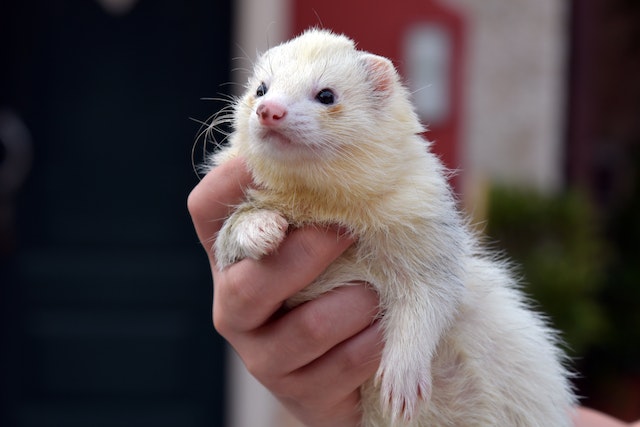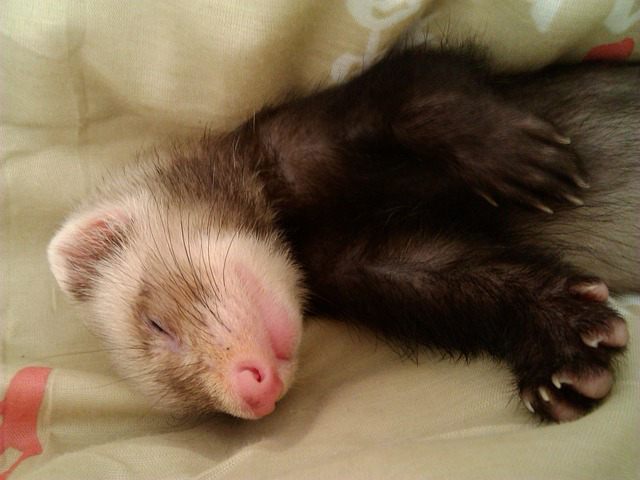How to Train a Ferret Not to Bite [Helpful Tips]
![How to Train a Ferret Not to Bite [Helpful Tips] How to Train a Ferret Not to Bite](https://petcreeks.com/wp-content/uploads/2023/12/istockphoto-177817907-612x612-1.jpg)
Let’s discuss how to train a ferret not to bite! Are you tired of those little nips and nibbles from your adorable furball?
Well, fear not, because I’ve got some pawsome tips to help you train your ferret not to bite.
In just these simple steps, you’ll be on your way to a bite-free bonding experience with your mischievous buddy.
Let’s dive in, shall we?
How to Train a Ferret Not to Bite
One popular method to train a ferret not to bite is scruffing, which involves grabbing the ferret by the loose skin on the back of its neck and saying “No” in a firm voice.
If the ferret continues to bite, it can be put in a “time out” by placing it in its travel carrier for 5 minutes.
It’s important to stay calm and never flick at the ferret’s nose, toss it aside, or yell at it since this can scare ferrets and lead to even more biting.
Let’s break it down further…
Understand the Reasons for Biting: Ferrets are curious and playful animals by nature. They explore the world around them using their mouths and teeth, much like puppies do. When a ferret is young, it is learning about its environment, and biting is a natural part of that learning process. Additionally, ferrets may bite out of fear, overstimulation, or even as a way to communicate. Understanding the reasons behind your ferret’s biting behavior is crucial in addressing and correcting it effectively.
Using the Scruffing Technique: The scruffing technique involves gently grasping the loose skin on the back of your ferret’s neck to simulate the way a mother ferret would handle her young. When done correctly, this technique can help convey to your ferret that biting is not acceptable. It’s important to note that this should not be used as a form of punishment, but rather as a gentle way of communicating that biting is not okay. This method should be used sparingly and in conjunction with positive reinforcement to effectively communicate with your ferret.
Use Positive Reinforcement: Positive reinforcement is a powerful tool in training any animal, including ferrets. When your ferret exhibits good behavior by refraining from biting, it’s essential to shower them with praise, affection, and perhaps even a small treat as a reward. This helps your ferret associate not biting with positive attention and rewards, encouraging them to continue the desired behavior. Consistency is key here, so be sure to consistently reinforce good behavior to help your ferret understand what is expected of them.
Give Your Ferret a 5 Minute Time-out When They Bite: If your ferret does end up biting, it’s important to address the behavior in a calm and controlled manner. Providing your ferret with a 5-minute time-out in a quiet, dark space can help them calm down and understand that biting leads to the end of playtime. This brief break can serve as a gentle way to communicate that biting results in the cessation of interaction, giving your ferret the opportunity to calm down and for you to take a breather as well.
Avoid Any Rough Play That Might Provoke Biting: Ferrets are naturally playful animals, but it’s important to recognize the threshold between playful behavior and rough play that can provoke biting. By avoiding overly rough play and ensuring that playtime is gentle and controlled, you can minimize the likelihood of your ferret resorting to nipping. Engage in activities that encourage positive interaction without escalating to a point where biting becomes a risk.
Use Bitter Apple Spray on Your Hands and Fingers: Bitter apple spray can serve as a deterrent to biting. By applying this safe and non-toxic spray to your hands and fingers, you can make the taste unappealing to your ferret, discouraging them from biting. This method helps to send a clear message to your ferret that biting will result in an unpleasant taste, thus reducing the likelihood of them engaging in the behavior.
Teaching Your Ferret Bite Inhibition: Bite inhibition is the process of teaching a ferret to control the force of its bite. When playing with your ferret and it bites too hard, let out a high-pitched squeak or say “ouch” to mimic the sound another ferret would make in response to pain. This communicates to your ferret that its bite was too strong. Over time, your ferret will learn to be more gentle to avoid causing discomfort.
Use a Firm Voice When Your Ferret Bites You to Correct Them: When your ferret bites, it’s important to respond in a way that communicates to them that their behavior is not acceptable. Using a firm voice, say “no” to provide immediate feedback. Additionally, gently scruffing your ferret (grasping the loose skin on the back of their neck) for a few seconds can mimic how a mother ferret would correct her young. This helps your ferret understand that biting is not an acceptable behavior.
Provide Chew Toys: Ferrets have a natural need to chew, and providing them with appropriate chew toys is essential. By offering a variety of safe and suitable chew toys, you can redirect your ferret’s chewing behavior away from human skin and onto the toys. This not only helps to prevent biting but also provides mental and physical stimulation for your ferret.
Provide Proper Socialization: Socialization plays a significant role in a ferret’s behavior. Exposing your ferret to different people, animals, and environments from a young age can help them feel more at ease and less anxious. Proper socialization can reduce the likelihood of fear-based biting and help your ferret become more well-adjusted and comfortable in various situations.
Related Questions
Why does my ferret bite?
Ferrets may bite due to playfulness, fear, or feeling threatened. It’s essential to understand the reason behind the biting to address it effectively.
How can I train my ferret not to bite?
Training your ferret not to bite involves gentle discipline, socialization, and positive reinforcement. Consistency and patience are key!
What should I do if my ferret bites me?
If your ferret bites, it’s crucial to remain calm and avoid reacting aggressively. Gently say “no” and redirect their attention to a suitable toy or activity.
Can I use treats to train my ferret not to bite?
Absolutely! Using treats as positive reinforcement can be effective in teaching your ferret to associate gentle behavior with rewards.
How can I socialize my ferret to prevent biting?
Introducing your ferret to various people, experiences, and environments can help them feel more comfortable and less prone to biting out of fear or anxiety.
Is it possible to stop a ferret from biting altogether?
While complete elimination of biting may be challenging, consistent training, socialization, and patience can significantly reduce biting behavior in ferrets.
Conclusion
In conclusion, training a ferret not to bite requires patience, consistency, and positive reinforcement. Remember to set clear boundaries and redirect their biting behavior towards appropriate toys and playtime. With time and dedication, you can build a strong bond with your ferret and enjoy a bite-free companionship.


![Ferret Whimpering [Causes & How To Respond] Ferret Whimpering](https://petcreeks.com/wp-content/uploads/2023/12/ferret-1970169_640.jpg)


![How Do I Know If My Ferret Is In Pain [See 11 Signs] How Do I Know If My Ferret Is In Pain](https://petcreeks.com/wp-content/uploads/2023/12/ferret-660546_1280-768x576.jpg)
